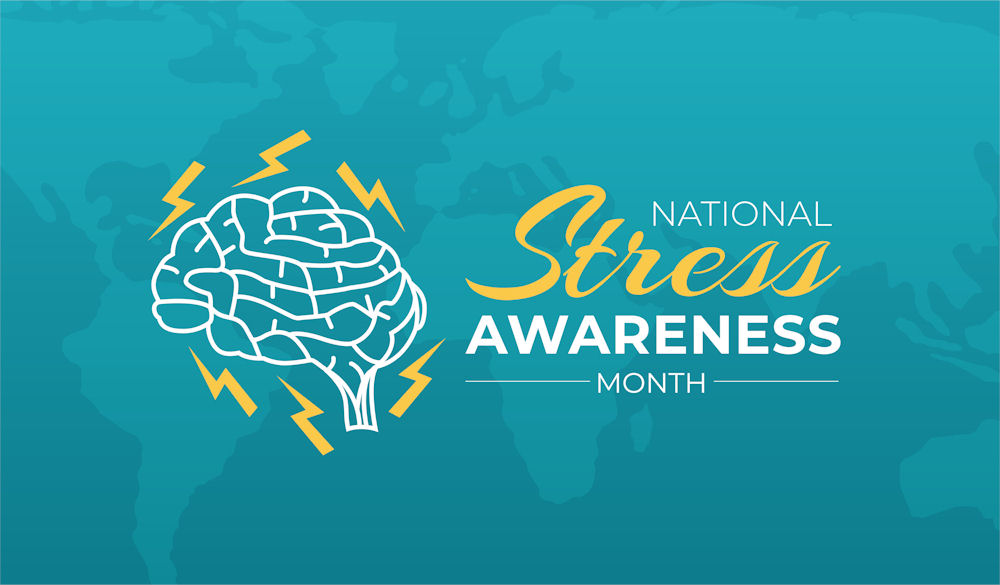April is recognized as Stress Awareness Month, a time dedicated to shedding light on the impact of stress on our overall well-being. Stress can manifest in many forms and affect individuals differently. One significant area where stress can have a profound influence is addiction. Understanding the connection between stress and addiction is crucial for both those struggling with addiction and their loved ones.
What is the Connection Between Stress and Addiction?
Jump to Section

Stress can contribute to the development of addiction, and also act as a trigger for relapse in those in recovery. Individuals may turn to substances as a way to escape or cope with their emotional distress when they face high levels of stress. This can provide temporary relief, creating a cycle of dependence that can be challenging to break.
Additionally, stress can impair an individual’s ability to make clear and rational decisions, leading to poor choices and an increased likelihood of engaging in substance abuse. The connection between stress and addiction is multifaceted, with stress both contributing to the development of addiction and being a consequence of addiction itself.
Furthermore, chronic stress can have a significant impact on the brain’s reward system, specifically the release of dopamine. This neurotransmitter is closely associated with feelings of pleasure and reward. When stress disrupts its normal functioning, individuals may seek out substances that artificially stimulate dopamine release (such as alcohol).
Moreover, the relationship between stress and addiction is not solely limited to chemical substances. Behavioral addictions (such as gambling or compulsive eating) can also be exacerbated by stress. The constant activation of the body’s stress response system can lead to changes in brain chemistry that make individuals more susceptible to developing addictive behaviors, as a way to cope with stressors in their environment.
Can Stress Cause Addiction?
While stress alone may not cause addiction, it can be a significant risk factor. Chronic stress can lead individuals to seek solace and temporary relief from substances. The desire for escapism or a means to numb emotional pain often drives individuals to engage in substance abuse, which can ultimately result in addiction. If you’re struggling with addiction, contact our addiction treatment center in Ocean Park, Washington today.
Stress can also disrupt brain chemistry and increase vulnerability to addiction. The neurotransmitters affected by both stress and substance abuse, such as dopamine or serotonin, play a crucial role in regulating mood and reward systems. Imbalances caused by chronic stress can make individuals more susceptible to the allure of addictive substances.
It is important to note that stress affects individuals differently, and not everyone who experiences stress will turn to substances as a coping mechanism. Factors such as genetics, environment, and support systems also play a significant role in determining an individual’s susceptibility to addiction.
Furthermore, the cycle of stress and addiction can create a self-perpetuating loop. Substance abuse may provide temporary relief from stress. But in the long run, it can exacerbate feelings of anxiety and depression. This can lead to a vicious cycle where individuals turn to substances to cope with the negative emotions caused by both stress and addiction. If you’re struggling with your mental health, Free by the Sea can assist you with our mental health treatment center.
How Does Addiction Affect Stress?
While stress is a catalyst for addiction, addiction can also exacerbate stress levels. Substance abuse can lead to deteriorating physical and mental health, strained relationships, financial struggles, and legal issues. These consequences can significantly contribute to an individual’s stress levels, creating a vicious cycle that intensifies addiction and stress.
Moreover, addiction often fosters feelings of guilt, shame, and isolation. This emotional burden further adds to stress levels, making it challenging to break free from the cycle of addiction without proper support and intervention.
It is important to note that the impact of addiction on stress is not limited to the individual struggling with substance abuse. Family members and loved ones of individuals battling addiction also experience heightened stress levels. They often face emotional turmoil, financial strain, and a sense of helplessness as they witness their loved one’s struggles.
Furthermore, the societal stigma surrounding addiction can compound stress for both the individual and their support system. The fear of judgment and discrimination can prevent individuals from seeking help, perpetuating the cycle of addiction and stress.
9 Tips for Managing Stress in Addiction Recovery
Managing stress is essential during addiction recovery to prevent relapse and promote overall well-being. Here are some practical tips to help individuals in recovery cope with stress:
1. Seek professional help
Engage with a therapist or counselor experienced in addiction recovery. This can provide valuable guidance and support in managing stress.
2. Practice self-care
Engage in activities that promote physical and mental well-being, such as exercise, proper nutrition, and relaxation techniques.
3. Build a support network
Surround yourself with a supportive circle of friends, family, or fellow individuals in recovery. This can provide a sense of community and understanding during times of stress.
4. Develop healthy coping mechanisms
Learning and implementing healthy ways to cope with stress, such as mindfulness, meditation, or artistic expression, can significantly contribute to stress reduction.
5. Set realistic goals
Establish realistic expectations and break larger tasks into smaller, manageable steps. This can alleviate stress and prevent overwhelming feelings.
6. Maintain a structured routine
Establishing a daily routine can provide a sense of stability and help individuals manage their time and stress effectively.
7. Avoid triggers
Identify and avoid situations, places, or individuals that may trigger stress and potential relapse.
8. Practice Gratitude
Take time each day to reflect on the things you are grateful for. This can shift your focus from stress and negativity to positivity and appreciation, and help create a more balanced perspective to reduce the impact of stress on your recovery journey.
9. Incorporate Mindfulness Into Your Day
Mindfulness involves paying attention to the present moment without judgment. By practicing mindfulness, you can cultivate a greater sense of self-awareness and learn to observe your thoughts and emotions without getting caught up in them. This can help you develop a more compassionate and understanding relationship with yourself, which in turn can reduce stress and enhance your overall well-being.
While these tips are valuable in managing stress during addiction recovery, it is important to understand that stress is a complex and individual experience. Each person’s journey to recovery is unique, and what works for one individual may not work for another. Therefore, it is crucial to explore different strategies and find what resonates best with you.
The Connection Between Stress And Mental Illness
Stress is a definite risk factor for developing mental illness, due to how it can limit activity in certain regions of the brain. The regions of the brain that control self-regulation are directly affected by chronic stress. Learning and motivation systems are drastically affected by stress early in life, with chronic stress also a factor in those systems working correctly in the brain.
Treatment for Co-Occurring Disorders
When seeking treatment for addiction, it’s helpful to locate a program that takes a dual diagnosis approach. This philosophy is about treating the addiction with and alongside the co-occurring mental illness. This allows for a holistic healing process that promotes knowledge and awareness of how to build a more balanced approach going forward.
Free by the Sea offers a combination of the following therapy programs:
- Individual therapy
- Group therapy
- Cognitive behavioral therapy
- Dialectical behavior therapy
- Eye movement desensitization and reprocessing therapy
- Motivational interviewing therapy
- Contingency management therapy
- Trauma therapy
With the therapy programs, clients are able to explore the root causes of their addiction and develop personalized strategies for long-term recovery. The unique environment fosters a sense of peace and renewal, allowing individuals to focus on their healing and personal growth without the distractions of everyday life. Individuals can engage in mindfulness practices, meditation, and outdoor activities that promote relaxation and self-reflection.
Free by the Sea Offers Addiction Treatment Services

As Stress Awareness Month brings attention to the important relationship between stress and addiction, it is vital to acknowledge the impact stress can have on individuals and their journey toward recovery. By understanding the connection and implementing effective stress management strategies, individuals can break free from the cycle of addiction and embrace a healthier and more fulfilling future.
For those seeking professional help in recovering from addiction and managing stress, Free by the Sea offers comprehensive addiction treatment programs. With a focus on holistic healing and individualized care, Free by the Sea provides a safe and supportive environment for individuals to address their addiction and develop healthy coping strategies for stress management.
Through a combination of evidence-based therapies, specialized counseling, and a range of holistic practices, Free by the Sea equips individuals with the tools they need to overcome addiction and live a fulfilling, stress-free life in recovery. Contact us today to learn more.

Dr. Richard Crabbe joined our team in 2019 as our psychiatrist and medical director. He attended the University of Ghana Medical School where he became a Medical Doctor in 1977. From 1978 through 1984, he was a medical officer in the Ghana Navy and provided a variety of services from general medicine to surgeries. He received his Certificate in General Psychology from the American Board of Psychology and Neurology in 2002.

 April 1st, 2024
April 1st, 2024










